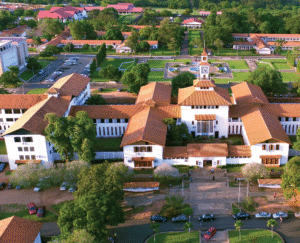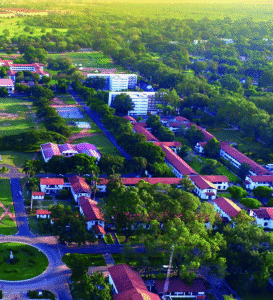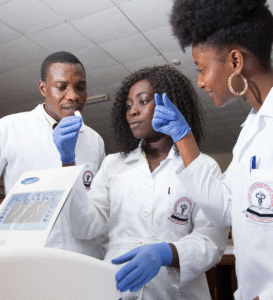 The UNIVERSITY was founded in 1948 as the University College of the Gold Coast on the recommendation of the Asquith Commission, on Higher Education in the then British colonies.
The UNIVERSITY was founded in 1948 as the University College of the Gold Coast on the recommendation of the Asquith Commission, on Higher Education in the then British colonies.
The Asquith Commission, which was set up in 1943 to investigate Higher Education, recommended among other things, the setting up of University Colleges in association with the University of London. This was followed up by a number of separate Commissions in different regions. The West Africa Commission was under the Chairmanship of the Rt. Hon. Walter Elliot. The Elliot Commission published a majority report which recommended the establishment of two University Colleges in the Gold Coast (Ghana) and Nigeria, and a minority report which held that only one University College for the whole of British West Africa was feasible.
The British Government at first accepted the minority report of the Elliot Commission and decided that a University College for the whole of British West Africa should be established at Ibadan in Nigeria. However, the people of the Gold Coast did not accept this recommendation. Led by the scholar and politician, the late Dr. J.B. Danquah, they urged the Gold Coast Government to inform the British Government that the Gold Coast could support a University College. Accordingly, the British Government reviewed its decision and agreed to the establishment of the University College of the Gold Coast.
The University College of the Gold Coast was founded by Ordinance on August 11, 1948 for the purpose of providing for and promoting university education, learning and research. Its first Principal was Mr. David Mowbray Balme, a farsighted and courageous leader dedicated to the promotion of scholarship. By his vision, industry and single-mindedness of purpose, he built a college and laid the foundations for a sound University which is now a source of pride. In his ten years of Principalship, he created an institution whose key-note was orderly living with dignity in a community of scholars.
One of the recommendations, of the Asquith Commission was that the British Government should set up an Inter-Universities Council to advise on all matters relating to Higher Education in the new British Colonies. Based on this recommendation, an Inter-Universities Council was set up to serve the new University College of the Gold Coast in an advisory capacity, and to approve all academic appointments. This arrangement helped the College to maintain the high academic standards associated with the Universities in Britain. Also, it enabled the College to seek support of the Council in obtaining funds from the United Kingdom Government sources.
From its inception, the University College of the Gold Coast was admitted to the Scheme of Special Relationship, extended by the University of London to certain English and overseas University Colleges. Under this scheme, the University College was allowed to teach for the external degree examinations of University of London. It also allowed the College to modify the London syllabuses to suit local conditions and to take part in the setting and marking of examinations. The University of London gave final approval for the running of courses and examinations, since it awarded the degrees.
For thirteen years, therefore, the University College looked up to two separate institutions in Great Britain: to the Inter-Universities Council for guidance on its broad policy, and to the University of London for approval and control of details of degree regulations. The University College benefitted greatly from this arrangement which certainly helped to maintain its high academic standards.
In the 1960-61 academic year, the College Council made a request to the Government of Ghana for legislation to constitute the University College into a University with the power to award its own degrees. The Government appointed an International Commission to examine the problem. On the recommendations of that Commission, the University of Ghana was set up by an Act of Parliament on October 1, 1961 (Act 79). The then President of the Republic of Ghana, Dr. Kwame Nkrumah, became the first Chancellor of the University, with Nana Kobina Nketsia IV, BLitt DPhil (Oxon), Omanhene of Essikado, as the (Interim) Vice-Chancellor.
66,088
Undergraduate Students
738
International Students
9,925
Graduate Students
6,479
Faculty & Staff

Research
The University of Ghana has several institutions and centres for learning and research, including
- Noguchi Memorial Institute for Medical Research(NMIMR)
- Centre for Tropical, Clinical Pharmacology and Therapeutics
- Noguchi Memorial Institute for Medical Research(NMIMR)
- Centre for Tropical, Clinical Pharmacology and Therapeutics
As part of its vision to become a world-class research-intensive institution, the University of Ghana has identified four priority areas where the university will focus and promote international collaboration in research initiatives to enhance the University’s research output. These areas are:
- Malaria Research
- Trans-disciplinary Research into Climate Change Adaptation
- Enhancing Food Production and Processing
- Development Policy and Poverty Monitoring and evaluation
 As the leading university in Ghana, the University aims to produce the next generation of thought leaders to drive national development. Through our research institutes and other centres of learning and research, faculty members are involved in studies that support policy making for national development, often in collaboration with other international institutions.
As the leading university in Ghana, the University aims to produce the next generation of thought leaders to drive national development. Through our research institutes and other centres of learning and research, faculty members are involved in studies that support policy making for national development, often in collaboration with other international institutions.There are currently a number of Ghanaian and international institutions that hold affiliation with the University of Ghana. As a leader in tertiary education, the University has established several link agreements with universities in Africa, Europe and North America for student, faculty and staff exchange as well as collaborative research.
The student population is over 38,000 made up of students enrolled on our regular programmes, sandwich programmes, and distance education as well as students from affiliate institutions. Our growing number of international students come from over 70 countries to join either our regular undergraduate and graduate programmes, enroll on our study abroad and other special programmes designed for international students.
The University of Ghana, has over the years built an image as one of the continent’s reputable universities which makes the University of Ghana the first choice for academics, researchers and students.
ALL EDUMA, ALL THE TIME
Certifications Eduma







